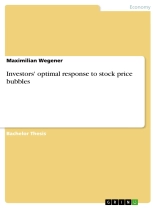Bachelor Thesis from the year 2013 in the subject Business economics – Investment and Finance, grade: 8.0, Maastricht University, language: English, abstract: According to the efficient market hypothesis there should not be an asset overvaluation. Nevertheless, bubbles appear from time to time in the real world. In a financial bubble, the price of a security deviates grossly from its fundamental intrinsic value (Watanabe, Takayasu & Takayasu, 2007). Fundamentals or fundamental value refer to economic variables such as discount rates or future cash flows (Siegel, 2003). Depending on the valuation technique one can define an asset’s intrinsic or fundamental value, based on economic variables and assumed growth. A financial bubble is defined as a price run-up, where an initial price rise generates positive expectations of higher future prices, which attracts new buyers that are rather interested in reaping profits by trading the assets than using its earnings capacity (Siegel, 2003). There is a long history of bubbles such as the 1720 South Sea bubble, 1929 the Great Crash, in the mid-1970s the REIT bubble, in 1987 the housing crash, in 1991 the banking crisis, in 2002 the NASDAQ technology bubble and just recently the housing bubble in the United States, just to name a few.
This capstone assignment deals with the question of how investors should act in the case of asset overvaluation in financial markets. In particular, it tries to answer how investors should behave. The central question asks whether investors should step aside and wait until the bubble bursts, whether they should ride the bubble or trade against it. Of course, there is support for all three, albeit contradicting theories. The different trading and investment strategies are reviewed, thereby touching upon various asset bubbles, financial concepts and empirical evidence in the academia. Moreover, it is elaborated on positive feedback trading and rational speculations, as well as behavioral finance concepts such as herding or overconfidence.
The remainder of this paper describes different concepts outlined in the empirical literature, starting with asset overvaluation, followed by the efficient market hypothesis and the random walk phenomenon. The role of arbitrage traders is explored, and their impact on efficient markets and bubbles discussed. A review of behavioral traits during bubbles and the impact of human behavior on asset prices is included. Further, there is an examination of mutual fund strategies and their success in exploiting profit opportunities during bubbles. Finally, it is summarized which arguments support each of the viewpoints.
Maximilian Wegener
Investors’ optimal response to stock price bubbles [PDF ebook]
Investors’ optimal response to stock price bubbles [PDF ebook]
购买此电子书可免费获赠一本!
语言 英语 ● 格式 PDF ● 网页 27 ● ISBN 9783656403197 ● 文件大小 0.6 MB ● 出版者 GRIN Verlag ● 市 München ● 国家 DE ● 发布时间 2013 ● 版 1 ● 下载 24 个月 ● 货币 EUR ● ID 3705987 ● 复制保护 无












